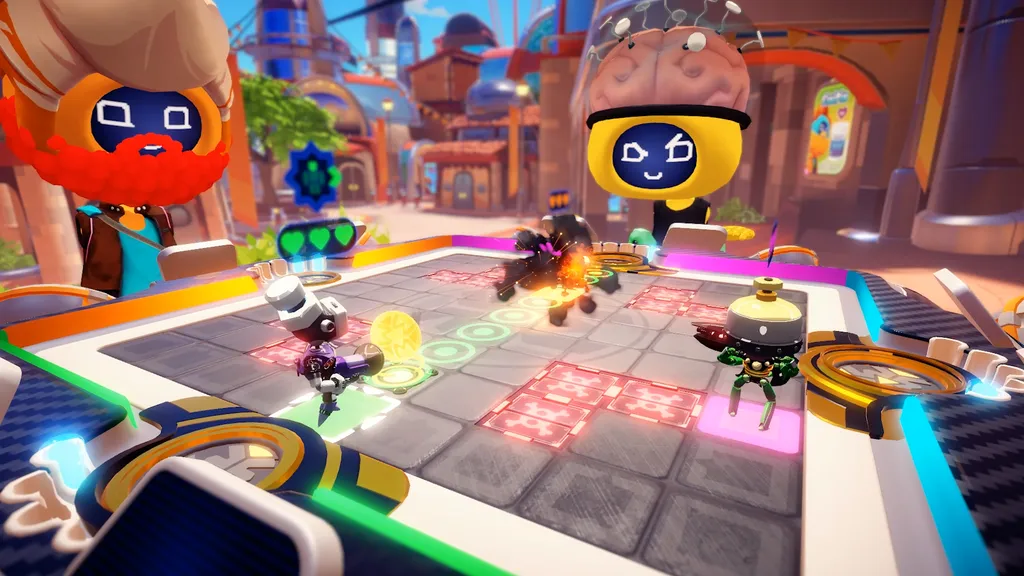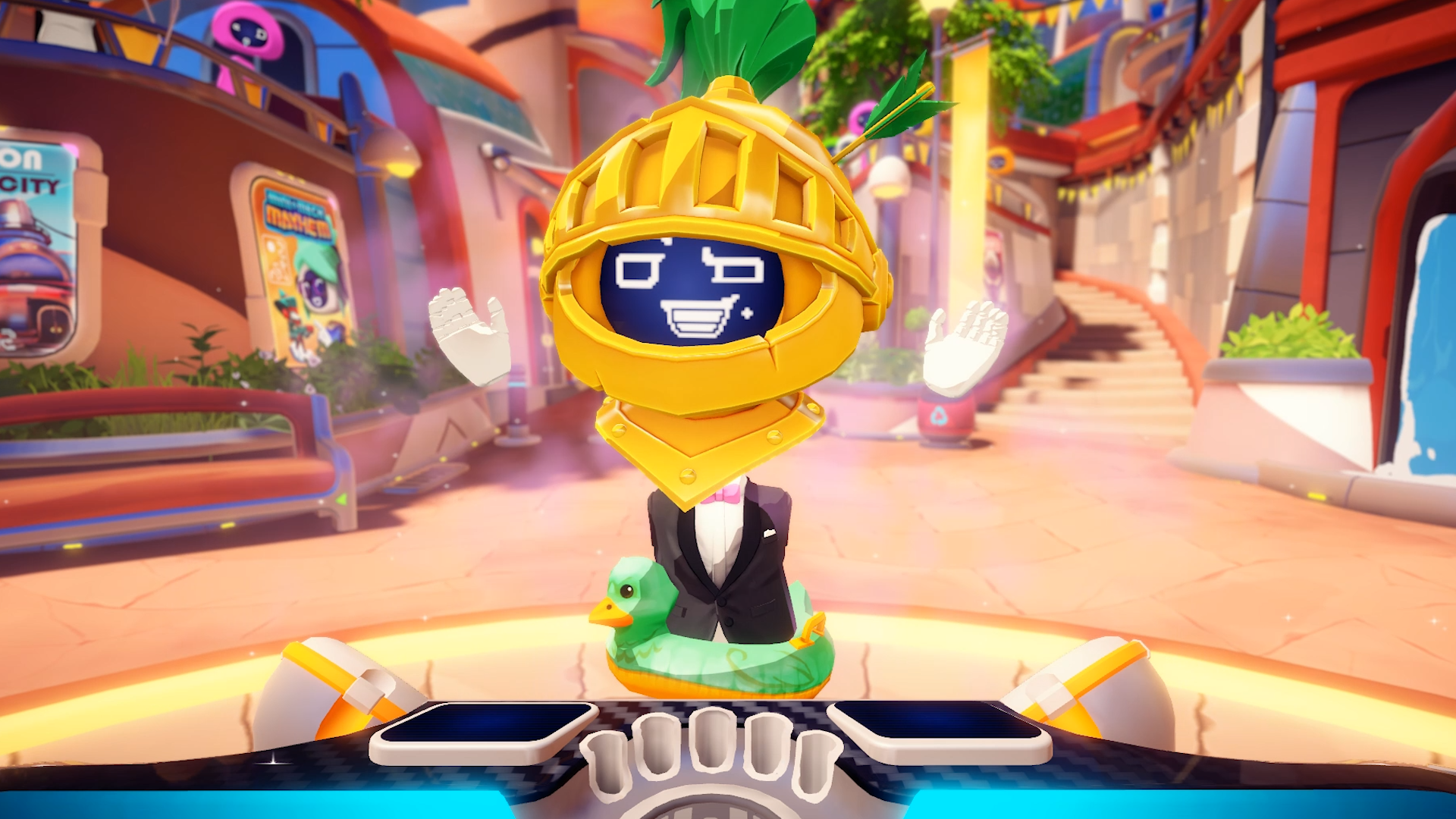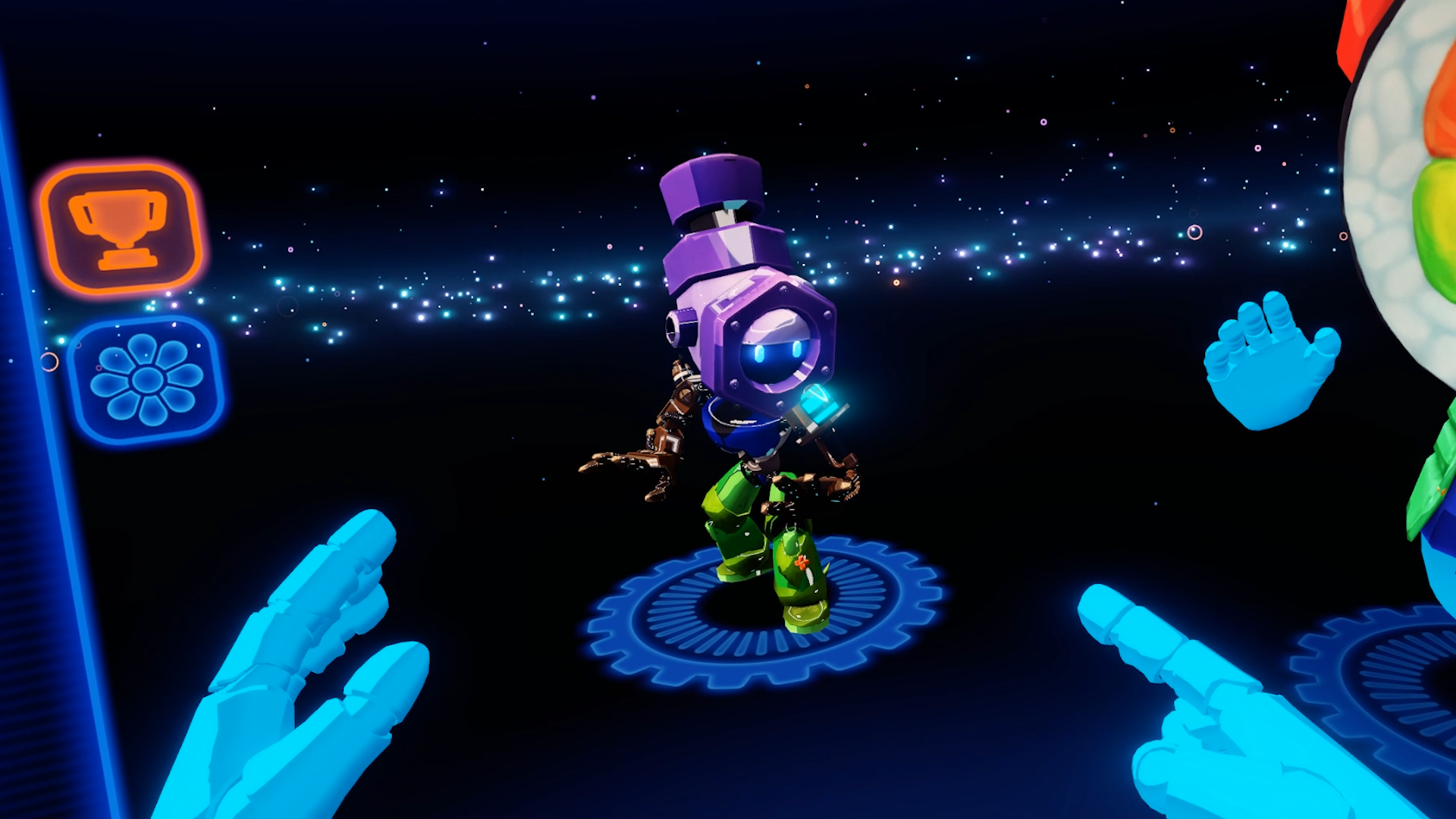Reassuringly, FuturLab knows what makes it FuturLab. This is a studio that’s rightly proud of its criminally addictive arcade titles like Velocity and its sequel, immaculately-produced gems with pinpoint mechanics that you can jump straight into but spend weeks attempting to master. Mini-Mech Mayhem is an interesting one, then. It’s entirely different to anything you’ll find in the company’s 15-year history and yet, without question, still a FuturLab game.
Instead of tying your fingers in knots, Mayhem is more interested in getting your brain in a twist. It’s a tabletop multiplayer game that comes to life in VR; you command a little robot buddy across a square grid, telling him where to move and when to shoot. Each player does this, but the order in which each turn plays out is determined by how far the player wants to move and which body parts they aim for. Want to sprint to the other side of the map and pop off a headshot? You’ll probably move last in the current turn if so and, by the time you’ve done it, your opponent might not be standing where you thought they’d be anymore.
Taking out your opponent’s mech isn’t the only goal; you’re trying to collect points that will appear in random places on the map. You need to anticipate if your enemy is going to make a sprint for an area and how to stop him if so while they’re doing the exact same thing. Hitting certain body parts will cause enemy mechs to change direction and even be bumped back a square. It’s a game about prediction, risk-taking and, most importantly, the hilarity of unexpected chaos. Above all, though, it’s a lot of fun.
Mini-Mech Mayhem isn’t FuturLab’s first encounter with VR or multiplayer; the studio also developed last year’s Tiny Trax, a likable if somewhat inaccessible take on Scalextric on PSVR. It retained the team’s core design philosophy of arcade gameplay that’s hard to master, though perhaps adhered to that a little too much. Studio founder James Marsden tells me that game’s development marked a turbulent time for FuturLab, but it’s helped them to come out swinging with their next attempt.
“We learned so much on Tiny Trax about what makes a good, immersive VR experience,” Marsden says. “What really worked was the idea that you’ve got your toys coming to life. And in Tiny Trax it was toy cars and we’ve all been fans of Warhammer, painting miniatures or collecting expensive figurines that aren’t just toys. Taking those pristine models that come to life was an idea that we all fell in love with.”
As the name suggests, then, Mini-Mech Mayhem stars a cutesy companion you can fit in the palm of your hand. It’s fully customizable with hundreds of cosmetic options (as is the player’s own avatar), but it’ll also interact with you in adorable ways like giving you a fist-bump when winning a match or dancing for you when standing on a podium. Think Astro Bot or Moss (two games Marsden repeatedly references as we talk) but with a touch of Pokemon-style companionship sprinkled in there. Marsden speaks to that certain brand of VR magic you get when you make eye contact with the little critter and how it enriches the experience.
“There’s a relationship you can have in VR first-person by representing yourself as an avatar,” Marsden continues. “You can build a relationship between you and your toy. We thought it’d be nice to have a team relationship that you’ve got with your little robot.”
Mayhem’s other inspiration comes from a boardgame named Robo Rally, which has you programming mechs using cards and then watching turns unfold in front of you. FuturLab captures the core strategic element of the game but aims to take some of the frustration out of the randomness of card-battling. It works to great effect; I played a 1v1 match (the full game supports up to four players) that bounced back and forth between the Chess-like pressure of trying to anticipate my opponent’s next moves and the relief/dismay that comes with watching events unfold. Get it right and you’ll be cheering down the microphone in sudden arrogance, get it wrong and you’ll probably be laughing at just how well you were out-witted.
“The better you get at the game the more you realize, like playing Chess, you learn to play the person against you,” Marsden adds. “You spot the opening moves but then surprises can come out of nowhere.”
These surprises are what Mayem currently calls ‘Intercepts’ (that name may change), which bring back in a bit of the FuturLab of old. These are special abilities you can use in certain conditions to turn the tide, like making a last-minute dodge if someone’s about to shoot you, or calling in an air strike that hits random spots on the map. You collect power orbs in order to unleash more powerful moves. Knowing where and when to use them will require you to be on the ball at all times, ready to make a sudden move that Marsden says can completely turn the game on its head. If you really know how to play, though, you can become “untouchable”.
But, strategy aside, Mini-Mech Mayhem embraces a sillier side of FuturLab that its fans won’t have seen before. You can dress up for robot like a plant, and the close proximity to other human avatars encourages a kind of camaraderie usually reserved for local multiplayer gaming. It really is like boardgame night with your friends without having to leave the house. “The game mechanics themselves are funny,” Marsden says. “We defined really early on that the game was daft. So the art style should be daft, the sound effects should be daft, everything you do in the customization should be daft.”
There’ll be single-player challenges to help you raise your skills but the core of Mayhem is going to be that banter incited between friends. I didn’t think I’d ever be saying that about a FuturLab game but, by applying its meticulous level of design to a new genre, I can say it’s a welcome change.
“If we can elevate that moment of stupid fun and polish it, polish it, polish it, then we’ll have a good game on our hands,” Marsden says. From what I’ve seen, Mini-Mech Mayhem is within spitting distance of making that happen.
Mini-Mech Mayhem is due to release in 2019 exclusively on PSVR.




























